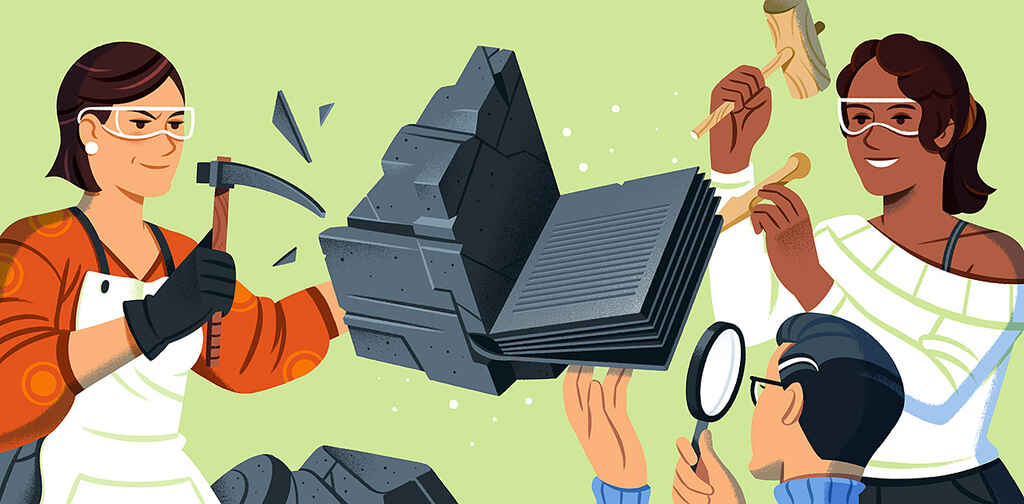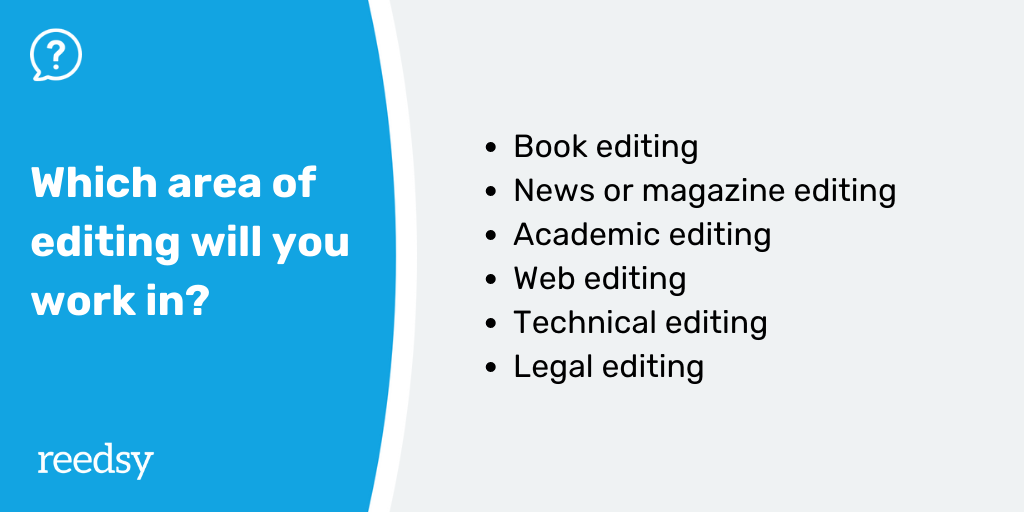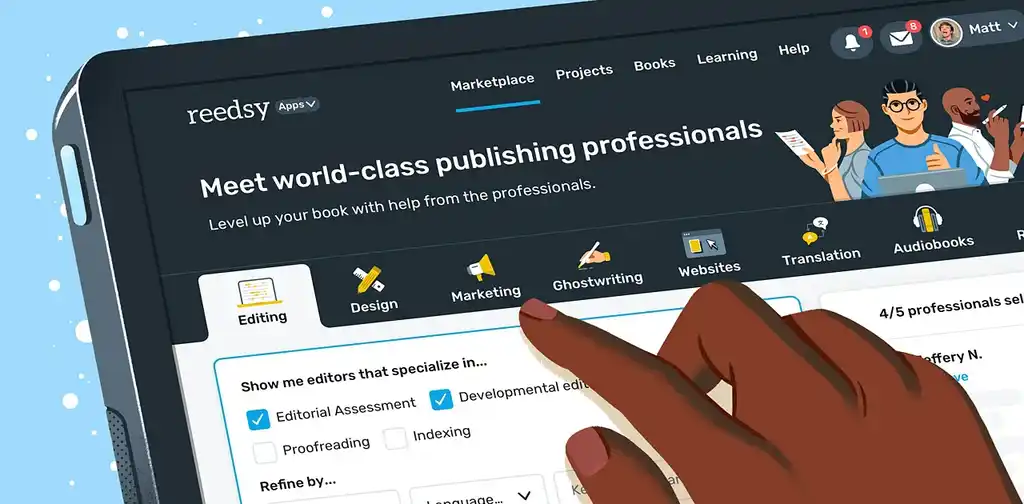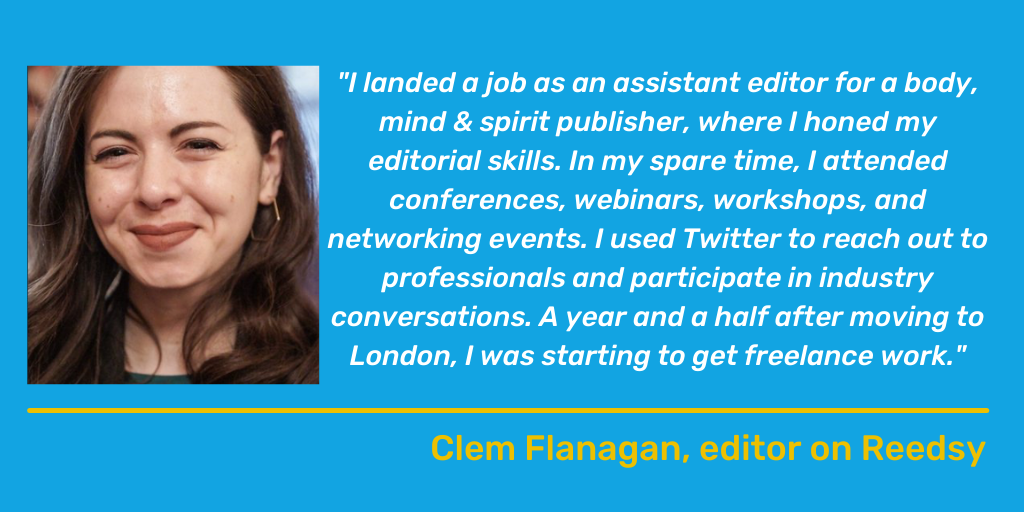Blog •
Last updated on Jun 24, 2025
How to Become an Editor in 2025: A Guide for Beginners
Savannah Cordova
Savannah is a senior editor with Reedsy and a published writer whose work has appeared on Slate, Kirkus, and BookTrib. Her short fiction has appeared in the Owl Canyon Press anthology, "No Bars and a Dead Battery".
View profile →Linnea Gradin
The editor-in-chief of the Reedsy Freelancer blog, Linnea is a writer and marketer with a degree from the University of Cambridge. Her focus is to provide aspiring editors and book designers with the resources to further their careers.
View profile →This post was written based on insights from professional Reedsy editors Clem Flanagan, Eli Bortz, and Aja Pollock.
Any process that results in published writing usually involves editors, which is why they form a key part of several industries. To become an editor, you need to build strong writing and storytelling skills, gain relevant experience, and build a solid professional network. Most editors also have a bachelor's degree in English, journalism, or a related humanities subject, but it's not a requirement as practical and specialized skills are seen as far more important. Read on to find out how to gain those.
What does an editor do?
An editor plans, coordinates, and revises pieces of writing for publication in books, newspapers, blog posts, magazines, and elsewhere.
Editors typically assess submissions and decide what should be published based on the quality of the writing and what might appeal to readers. They then polish the content and prose of the writing to ensure correct grammar, spelling, and punctuation, as well as consistent and clear storytelling or structure before publication.

The exact duties of a professional editor differ in each industry, with many related administrative tasks attached to the role. For instance, video editors have different tasks from those of editors who work with authors and on written material (which this post will focus on).
As we look at how to get into editing of written texts we’ll learn more about the sheer variety of the work it entails — so, let’s get started!
🤓 Curious about how much money an editor makes? Head to this post on editor salaries for more information.
Can I become an editor without a degree?
Before we dive into the nitty-gritty of how to become an editor, let’s talk about degrees and relevant qualifications.
Out of ten Reedsy editors we selected at random, six of them majored in Literature, one of them majored in Journalism, one of them majored in Medieval Culture, one of them majored in History, Political Science, and Journalism, and one of them majored in Modern English Studies.
So, even if many editors out there do have an undergraduate degree in Literature or English, that’s not the be-all and end-all. For those of you who are able to afford and commit to a degree in the humanities — or even a publishing degree — it can definitely help you and your CV stand out.
But if higher education isn’t in the cards for you at the moment, don’t fret! Many successful editors built their craft through short-term courses and certifications for editing. Reedsy editor Aja Pollock, who has taken courses in copy editing, proofreading, and developmental editing, “definitely recommends them to anyone starting out.”
“The foundational courses I took… were all very helpful. They allowed me to develop a consistent process for each type of editorial work, and understand the expectations for each role and how it fit into the larger process of book publishing.”
If a short-term course isn’t an option for you either, Reedsy editor Eli Bortz, who studied history, political science, and journalism at university, believes that hands-on experience “beats any course or lecture you could ever attend” and has even steered many of his undergraduate assistants towards work environments where they get to learn by doing.
Even if you’ve got countless academic degrees, you’ll be hard-pressed to find eager clients or a willing employer at a publishing company if you’ve never edited a full manuscript before. More than anything, it all comes down to experience and a proven track record, so let’s look closer at how to get that.
How to become an editor in 5 steps
Now that we’ve discussed the possibility of becoming an editor without a degree, here are five simple steps to follow to help you get your career started:
1. Choose your type and style of editing
Editing is a broad field, and it always helps to start by pointing your career in a direction: an area of publishing you would like to work in. As with every career, you never know where you might actually end up, but knowing the options and picking a lane can help you better prepare yourself in terms of getting the right qualifications and work experiences.

Here are the six major types of editing that you can explore:
Book editing
A book editor works closely with writers to revise and streamline manuscripts ahead of publication. This involves various types of editing, from editorial assessment (also known as manuscript evaluation) to developmental editing and copy editing (or line editing).
You can read more about the different types of editing here.
Proofreading is also a form of editing that comes at the end of the process, and sometimes you will hear people refer to these draft stages as first, second, third, and final pass editing.
All types of editing can be done on a freelance basis, but it is especially common when it comes to copy editing and proofreading, as publishers or authors often commission external professionals for these services.

JOIN OUR NETWORK
Supercharge your freelance career
Find projects, set your own rates, and get free resources for growing your business.
Aside from editing text, an editor working at a publisher and their smaller subsidiaries may have different responsibilities depending on the structure and size of the imprint. They may have tasks such as budgeting, coordinating publication catalogs, and even interior design.
They also need to be highly organized team players, as they are responsible for communicating with authors and their representatives, as well as colleagues; coordinating with other departments like marketing, design, and publicity; commissioning new titles; and performing routine administrative tasks such as writing cover blurbs and updating book metadata.
💡Job titles: editorial assistant, assistant editor, editor, senior editor, commissioning editor, editorial director (Note: these particular roles are listed in order of the career advancement ladder, from entry level to more senior roles.)
News and magazine editing
A news or magazine editor's responsibilities include proofreading and structurally editing articles; fact-checking; ensuring consistency with the publication’s house style and relevance to the publication’s aims or themes (if any); commissioning articles from regular contributors; responding to pitches; and reporting to the publication’s editorial board.
Sub-editors usually only work on editing text and do not have any commissioning/managerial duties, whereas section editors develop the strategy and direction of their section and report to management.
💡 Job titles: section editor, associate editor, sub-editor, editor
Academic editing
Unsurprisingly, academic editors belong to the area of scholarly output. They can hold full-time, in-house positions at an academic publisher (e.g., Oxford University Press) or voluntary, part-time roles as editors of an academic journal.
In addition to being well-versed in structural and copy editing, these editors ensure academic rigor, objectivity, and ethical academic practice. The latter involves checking for plagiarism, fact-checking, verifying bibliographical data, and arranging for the creation of an index. Academic editors are also expected to coordinate the peer-review process and communicate feedback to authors.
💡 Job titles: academic editor, journal editor
Web editing
A web editor is responsible for managing an organization’s digital content. The specifics will vary, but typical duties include editing articles or blog posts for publication, commissioning or assigning new pieces of content, deciding on subjects to be covered, using Search Engine Optimization (SEO) to attract organic traffic, making decisions about how posts are presented, and promoting said content on social media (or collaborating with social media marketers) to increase the reach of the product.
💡 Job titles: web editor, content editor, content manager, blog manager, head of content
Technical editing
A technical editor is not so concerned with grammatical correctness or fluency of expression. Instead, their main focus is to ensure that highly technical information is accurate and communicated clearly. For this reason, technical editors with expertise in the subject matter at hand are usually highly sought after and hired to apply their knowledge to a piece of writing.
From checking that any equations and graphs are accurate to ensuring information complexity meets the knowledge level of the intended audience, a technical editor operates as a subject matter consultant.
💡 Job titles: technical editor, subject-matter expert (SME)
Legal editing
A legal editor’s job is not vastly different from that of a technical editor: the primary aim is to ensure the accuracy of legal texts and compliance with the aims of the publication at hand.
A legal editor may also be responsible for compiling “digests” of court cases, researching legal issues, or analyzing legal news or developments.
💡 Job titles: legal editor, legal researcher, legal reporter
After you’ve decided on the area of editing you want to work in, you’ll need to focus on accumulating some first-hand experience.
Q: How did you find your niche in editing?
Suggested answer
I started my own publishing house back in 2015 when ebooks were making a name for themselves. I had also published my first novel with a different publishing house right when 50 Shades of Grey came out, but my book fell into a black hole, so I didn't get noticed. Once I opened up my own place, I decided to provide a home for books that didn't cross into erotica, but still had spice and encapsulated what the romance industry was about.
I did that for 15 years and now, while my specialty is to help authors with "clean" books, I edit all genres and all levels of heat. I can still appreciate those, too! Remember, specialty doesn't always mean 100% preference.
Stephanie is available to hire on Reedsy ⏺
I worked in fashion and women's lifestyle magazines for many years as a writer, an editor, a consultant and an editor-in-chief. That means I've written or overseen hundreds of stories in the lifestyle space and I've had to be very creative about making each one of them unique. As a reader I love smart, entertaining lifestyle writing, so I work hard to make my work as a ghostwriter meet those standards.
Ceri is available to hire on Reedsy ⏺
2. Gain experience through internships and freelancing
In an ideal world, you’d immediately find an entry-level position that gets your foot through the door so you can learn on the job. But despite being considered entry-level, editing positions can be competitive and usually require some prior engagement or experience with editing or writing.
You may be able to nab one of these coveted roles if your CV contains relevant extracurriculars (such as being a student reporter or editor), but many aspiring editors start out by securing administrative work experience, an internship, or part-time editing experience as a freelancer. These opportunities offer a chance for aspiring editors to experience working with authors and clients, hone their editing and communication skills, build their networks, and grow their editorial portfolios.
To find book editing internships, check Indeed, LinkedIn, and, if you are still in school or have recently graduated, your college’s job search portal. It’s also worth getting involved in social media platforms such as Twitter — at least as a reader. Managing editors and publishers post about vacancies and networking events all the time!

If you can’t find (or can’t afford to take) an internship, look for short-term gigs on freelancing sites. Note that even with a compelling profile and plenty of self-marketing, you might have to take jobs that don’t really interest you at first. For instance, you might plan to specialize in developmental book editing, but you might find yourself copy editing blogs and academic essays to start with.
As long as you learn and grow from your experiences, that shouldn’t discourage you. You’ll soon be able to apply for entry-level positions…
3. Apply for entry-level publishing and editorial positions
Reedsy editor Clem Flanagan tells us that her years working in entry-level positions were crucial in forging her network and skills. Most editors are happy to refer writers to fellow professionals who are either more experienced or looking for gigs.
Authors themselves often recommend editors to their writer friends, so you should never underestimate the power of word of mouth. You may start small, but if you build that reputation by working entry-level jobs steadily, it’ll pay off.
This part of your editing career is the definition of hustling. You’ll most likely work long hours, not getting paid as much as you deserve. But if you can push through all that, you’ll emerge on the other side with the kind of knowledge and experience that you can build a more sustainable career on. Hang in there!
Q: How did you secure your first editorial assistant role, and what was the most challenging part of breaking into the industry?
Suggested answer
I finally got my start in editing and publishing through a lot of luck and a lot of determination. One of the hardest things about editing is that it is a very small community, and many of the roles are granted by knowing the right people or being in the right place at the right time.
I knew that it would be difficult to break into, so I applied to every internship and entry level position I could find when I was starting my career. That eventually landed me a role at a high school textbook publishing company, where I started as a Marketing Intern. Once you have your foot in the door, you have to do everything you can to become essential. I stayed in that role for almost 9 months before a role within the company finally opened up and I became an Editorial Assistant.
The toughest part of breaking in is the diligence. There are so few open entry level positions and SO many applicants that it can really feel like a fruitless endeavor. But there are ways in, and if you're struggling to get a position at your favorite genre publisher, then maybe you can look to different tracks and find other ways into editing. I'm not saying you need to follow my lead of working for textbooks or in marketing departments, but there is quite a bit more to publishing than just editorial.
Matt is available to hire on Reedsy ⏺
4. Network with clients and publishing professionals
Assuming you’ve now got substantial editing experience, you’ll have naturally accrued some contacts in your industry, online or in real life. From literary agents and journalists to academics and creative directors, you’ll know a good number of people in different positions within your field.
And you might not realize it at first, but sub-fields of professional activity in a particular city or region are a small world, where you’ll run into the same people throughout your career.

Make sure to always respond to strangers’ requests politely and thoughtfully, even if you want to decline. Introduce people who might like to work together to each other. Recommend your best co-workers. Put in a good word for entry-level assistants when you’ve progressed to a more senior level. Treat interns with patience and respect. Send people job opportunities you happen to see that they may be interested in.
All of that — in other words, being a kind, respectful, and decent person to work with — will help you in more ways than you can imagine.
This may not come in the form of a job offer falling onto your doorstep from the heavens. But it’ll work in quiet ways that’ll lead to people treating you well and taking you seriously, as well as giving you a boost of good karma as your career progresses.
5. Get promoted to a senior editor position

With experience under your belt and a large network, you’ll start noticing where your natural skills lie and what you enjoy doing the most. So while you’re working on a variety of projects, you should be thinking about what kind of editor you’d like to be down the line.
Even if you aren’t ready yet to move into a new role, keep your eyes open for new opportunities. Read through job descriptions for editorial roles within your industry and beyond it, and make a note of any recurring requirements, such as familiarity with specialist software or SEO.
You can then slowly work on your skills to become an even better editor in your free time or within your current role, with a view to transition to a different job. For example, an editorial assistant for the Lifestyle section of a magazine could find their way into nonfiction book publishing via a Lifestyle imprint that publishes health and food and drink titles. Meanwhile, if you’re happy with the niche you’re in, the ladder-climbing begins.
Alternatively, you can look into starting your own business and becoming a freelance editor on Reedsy to exercise more control over your work days.
💼
Are you ready to join Reedsy?
Find out here! Takes 1 minute
Down the line, who knows what you’ll accomplish? A project you’ve worked on might just end up topping bestseller lists or winning a Pulitzer Prize. One thing is for sure: if you’ve always wanted to make your mark on the world, becoming an editor is an amazing way to do that.

